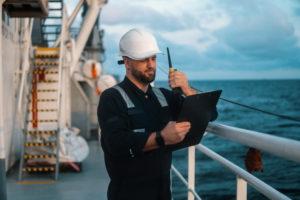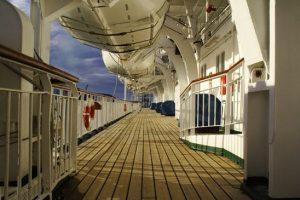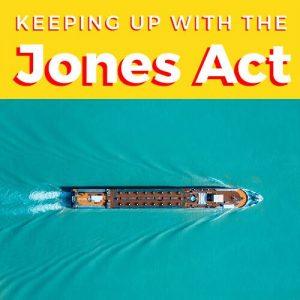
There are several laws protecting maritime workers injured on the job. The most prominent of these include:
- The Maritime Marine Act of 1920 (Jones Act)
- The Death on the High Seas Act (DOHSA)
- The doctrine of unseaworthiness
- Maintenance and cure
Be aware that if you are a maritime worker and have been injured on the job, your path to financial recovery may be different from other workers. The complexity of maritime law and the fact that so much of it is rooted in case law and common law, rather than codified in statutes, demands the guidance and experience of a trusted maritime lawyer.
The Jones Act
The Jones Act allows injured maritime workers the ability to claim damages for injuries they have suffered while working on qualifying vessels. The compensation they may be able to collect includes medical bills and lost income.
Because maritime workers do not generally qualify for workers’ compensation coverage, this law provides these workers with a path to attempt to collect benefits for their workplace injuries.
For a free legal consultation, call (800) 537-8185
The Death on the High Seas Act
When you lose a family member at sea, DOHSA may apply. This law gives you a way to recover compensation for the loss of your family member if they died while at sea. However, this law only goes into effect when a vessel is at least three miles off the U.S. coast.
DOHSA claims are based on a theory of negligence. To win, you’ll need to prove that the vessel’s owner, operator, or your loved one’s employer:
- Owed your loved one a duty of care to provide safe working conditions
- Breached that duty of care by failing to provide your loved one with safe working conditions
- Because of the breach of duty, an accident occurred where your loved one died
Proving this might seem obvious to you, but you’ll need to provide objective evidence of negligence. Especially when dealing with large and multinational corporations, that’s not always easy to do, as they will fight you every step of the way. To handle this battle, you need an aggressive maritime legal advocate on your side.
The Doctrine of Unseaworthiness
The doctrine of unseaworthiness states that a ship’s owner/operator has a duty to provide a safe and seaworthy vessel. The doctrine also states that the owner must maintain the vessel’s seaworthiness and fit for its intended purpose. If any part of the vessel, or possibly even equipment on the vessel is not operating properly or correctly maintained, the vessel could be deemed unseaworthy.
This doctrine may allow injured maritime workers the ability to hold employers strictly liable for injuries suffered at sea. Strict liability is a legal concept where, if you can show you were injured, you may not have to prove negligence. The mere fact of your injury proves that your employer is to blame and may have to compensate you financially.
Unseaworthiness could include almost any safety issue on the vessel — it does not only refer to the vessel itself. Examples include:
- Safety issues with the vessel and hull
- Protective equipment on board the vessel
- Inoperative tools
- Insufficient number of crew members
- Inexperience of crewmembers
- Lack of crewmember training
Click to contact our personal injury lawyers today
Maintenance and Cure
Maintenance and cure is another legal concept of maritime law. Maintenance is the maritime worker’s day-to-day living expenses, and cure refers to the medical costs. If an employer is found liable for your injuries, you may be able to collect maintenance and cure damages from them.
It’s important to understand that these laws are not discussed in a vacuum. Rather, they can work together. So if you have a claim under the Jones Act, you can also seek compensation under maintenance and cure.
In fact, it’s recommended that you do so in an attempt to avoid paying a dime out of your own pocket to cover medical expenses and lost income related to your workplace injury. But these are complex laws and theories that will require the guidance of an experienced and aggressive maritime lawyer.
Don’t Delay in Seeking Help with Your Case
No matter what injuries you have received and no matter who is to blame, if you have been injured at sea, you need to act fast. These laws offer maritime workers like you certain protections but that does not last forever.
Each law has a statute of limitations associated with it, limiting the amount of time you have to bring a claim against your employer or any negligent party. If you do not file your claim before the expiration of that time period, you will lose your chance to collect maximum compensation for your injuries and may be on the hook for covering your medical expenses.
Suffering maritime injuries is bad enough. You may already be dealing with life-altering injuries and the last thing you need is to worry about covering the massive medical expenses and financial losses. Partner with a trusted lawyer today to avoid missing this important filing deadline.
We Get Results for You
With over 100 attorneys and 15 offices, we have the right lawyer for you. For over 40 years, we’ve been honored to help our injured neighbors get compensation for their workplace injuries. We are proud to help maritime workers overcome the complexities involved in maritime law.
Our goal is to give you the compassion you need while being an aggressive legal advocate, working diligently to prove you are entitled to maximum compensation for your injuries. Find out more about what we can do for you and please review our results — we think they speak for themselves.
Contact the Lawyers at Morris Bart Today
Maritime law is complex and not every lawyer has the skill necessary to handle these types of cases. At Morris Bart, we provide a free case evaluation and, if we take your case, help you work toward collecting maximum compensation for your injuries. There’s no obligation to speak with us and you only pay us if we win.
Contact us online or by calling to schedule your free consultation with our experienced team.
Questions?Call (800) 537-8185
to find a Morris Bart office near you.





